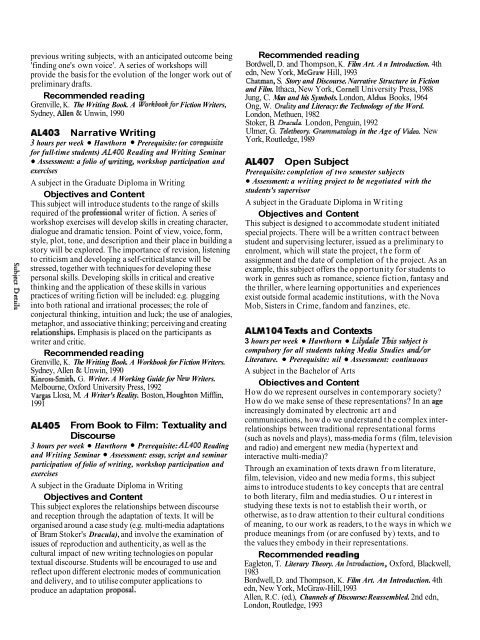1996 Swinburne Higher Education Handbook
1996 Swinburne Higher Education Handbook
1996 Swinburne Higher Education Handbook
You also want an ePaper? Increase the reach of your titles
YUMPU automatically turns print PDFs into web optimized ePapers that Google loves.
previous writing subjects, with an anticipated outcome being<br />
'finding one's own voice'. A series of workshops will<br />
provide the basis for the evolution of the longer work out of<br />
preliminary drafts.<br />
Recommended reading<br />
Grenville, K. The Writing Book. A Workbookfor Fiction Writers,<br />
Sydney, Allen & Unwin, 1990<br />
A1403 Narrative Writing<br />
3 hours per week Hawthorn Prerequisite: (or corequisite<br />
for full-time students) AL400 Reading and Writing Seminar<br />
Assessment: a folio of writing, workshop participation and<br />
exercises<br />
A subject in the Graduate Diploma in Writing<br />
Objectives and Content<br />
This subject will introduce students to the range of skills<br />
required of the professional writer of fiction. A series of<br />
workshop exercises will develop skills in creating character,<br />
dialogue and dramatic tension. Point of view, voice, form,<br />
style, plot, tone, and description and their place in building a<br />
story will be explored. The importance of revision, listening<br />
to criticism and developing a self-critical stance will be<br />
stressed, together with techniques for developing these<br />
personal skills. Developing skills in critical and creative<br />
thinking and the application of these skills in various<br />
3 practices of writing fiction will be included: e.g. plugging<br />
into both rational and irrational processes; the role of<br />
conjectural thinking, intuition and luck; the use of analogies,<br />
metaphor, and associative thinking; perceiving and creating<br />
relationships. Emphasis is placed on the participants as<br />
writer and critic.<br />
Recommended reading<br />
Grenville, K. The Writing Book. A Workbook for Fiction Writers.<br />
Sydney, Allen & Unwin, 1990<br />
Kinross-Smith, G. Writer. A Working Guide for New Writers.<br />
Melbourne, Oxford University Press, 1992<br />
Vargas Llosa, M. A Writer's Reality. Boston, Houghton Mifflin,<br />
1991<br />
AL405 From Book to Film: Textuality and<br />
Discourse<br />
3 hours per week Hawthorn Prerequisite: AL400 Reading<br />
and Writing Seminar Assessment: essay, script and seminar<br />
participation of folio of writing, workshop participation and<br />
exercises<br />
A subject in the Graduate Diploma in Writing<br />
Objectives and Content<br />
This subject explores the relationships between discourse<br />
and reception through the adaptation of texts. It will be<br />
organised around a case study (e.g. multi-media adaptations<br />
of Bram Stoker's Dracula), and involve the examination of<br />
issues of reproduction and authenticity, as well as the<br />
cultural impact of new writing technologies on popular<br />
textual discourse. Students will be encouraged to use and<br />
reflect upon different electronic modes of communication<br />
and delivery, and to utilise computer applications to<br />
produce an adaptation proposal.<br />
Recommended reading<br />
Bordwell, D. and Thompson, K. Film Art. An Introduction. 4th<br />
edn, New York, McGraw Hill, 1993<br />
Chatman, S. Story and Discourse. Narrative Structure in Fiction<br />
and Film. Ithaca, New York, Cornell University Press, 1988<br />
Jung, C. Man and his Symbols. London, Aldus Books, 1964<br />
Ong, W. Orality and Literacy: the Technology of the Word.<br />
London, Methuen, 1982<br />
Stoker, B. Dracula. London, Penguin, 1992<br />
Ulmer, G. Teletheory. Grammatology in the Age of Vtdeo. New<br />
York, Routledge, 1989<br />
AL407 Open Subject<br />
Prerequisite: completion of two semester subjects<br />
Assessment: a writing project to be negotiated with the<br />
students's supervisor<br />
A subject in the Graduate Diploma in Writing<br />
Objectives and Content<br />
This subject is designed to accommodate student initiated<br />
special projects. There will be a written contract between<br />
student and supervising lecturer, issued as a preliminary to<br />
enrolment, which will state the project, the form of<br />
assignment and the date of completion of the project. As an<br />
example, this subject offers the opportunity for students to<br />
work in genres such as romance, science fiction, fantasy and<br />
the thriller, where learning opportunities and experiences<br />
exist outside formal academic institutions, with the Nova<br />
Mob, Sisters in Crime, fandom and fanzines, etc.<br />
ALM104Texts and Contexts<br />
3 hours per week Hawthorn Lilydale 7% subject is<br />
compulsory for all students taking Media Studies and/or<br />
Literature. Prerequisite: nil Assessment: continuous<br />
A subject in the Bachelor of Arts<br />
Obiectives and Content<br />
How do we represent ourselves in contemporary society?<br />
How do we make sense of these representations? In an age<br />
increasingly dominated by electronic art and<br />
communications, how do we understand the complex interrelationships<br />
between traditional representational forms<br />
(such as novels and plays), mass-media forms (film, television<br />
and radio) and emergent new media (hypertext and<br />
interactive multi-media)?<br />
Through an examination of texts drawn from literature,<br />
film, television, video and new media forms, this subject<br />
aims to introduce students to key concepts that are central<br />
to both literary, film and media studies. Our interest in<br />
studying these texts is not to establish their worth, or<br />
otherwise, as to draw attention to their cultural conditions<br />
of meaning, to our work as readers, to the ways in which we<br />
produce meanings from (or are confused by) texts, and to<br />
the values they embody in their representations.<br />
Recommended reading<br />
Eagleton, T. Literary Theory. An ~ntrodtrction, Oxford, Blackwell,<br />
1983<br />
Bordwell, D. and Thompson, K. Film Art. An Introduction. 4th<br />
edn, New York, McGraw-Hill, 1993<br />
Allen, R.C. (ed.), Channels of Discourse: Reassembled. 2nd edn,<br />
London, Routledge, 1993
















